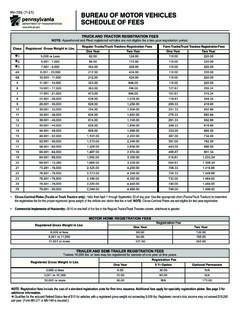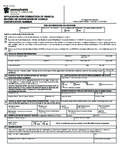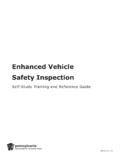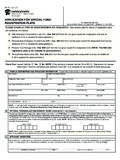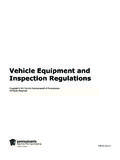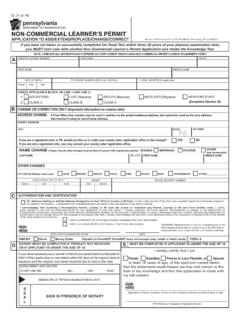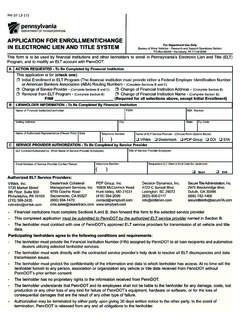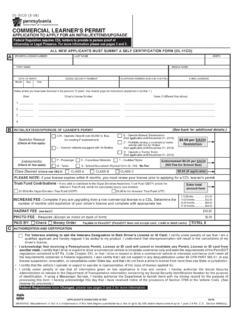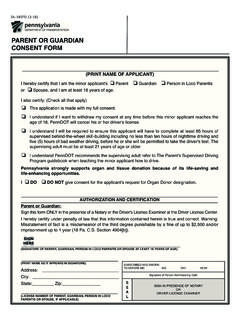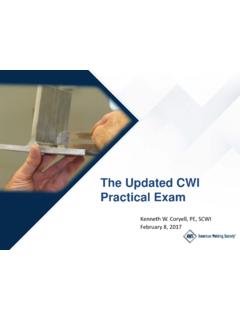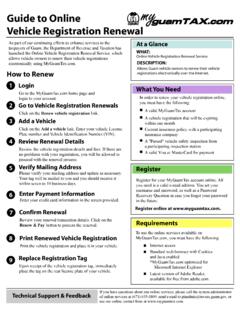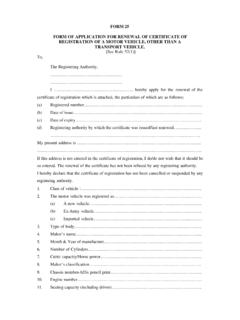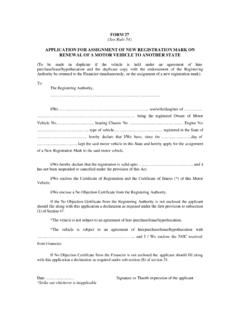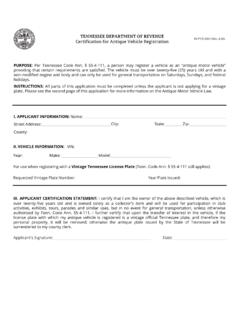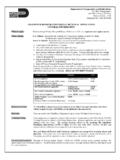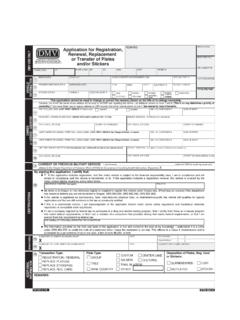Transcription of PennDOT Fact Sheet - Commercial Vehicle Registration ...
1 FACT Sheet . Commercial Vehicles Registration Requirements OVERVIEW. A Commercial Vehicle is any type of motor Vehicle used for transporting goods or passengers for compensation. Commercial Vehicle operations are categorized as either intrastate or interstate operations. Interstate operations require the applicant to operate in Pennsylvania and at least one other jurisdiction. Upon meeting the Registration requirements, the applicant will obtain an apportioned Registration plate. Intrastate operations require the applicant to conduct point to point operations within Pennsylvania. Non-apportioned Commercial vehicles may operate in another jurisdiction with the purchase of a temporary permit from the jurisdiction where travel is desired. Pennsylvania is a title state which requires a Vehicle to be titled prior to Registration being issued, however, an out- of-state title owner may lease his Vehicle to a Pennsylvania apportioned registrant.
2 The Vehicle owner must provide a photocopy of the front and back of the out-of-state title. A lease agreement between the Vehicle owner and the lessor is also required in order to create a Pennsylvania non-negotiable title record before Registration may be issued. Intrastate Operations - Intrastate operations occur when Commercial vehicles transport goods or passengers from one point to another point within Pennsylvania. Vehicles primarily conducting intrastate operations are issued Registration plates labeled as; Bus, Limousine, Taxi, or Truck at the bottom. A temporary permit is required for a Commercial truck registered over 26,000 pounds or a non-chartered bus travelling outside of Pennsylvania. Limousines and taxis operating outside of their regulated areas must obtain the proper authority prior to operating in that area.
3 Additional information on intrastate vehicles and operations may be found by reviewing Publication 479, Fleet Registration Instruction Manual, found on the Driver and Vehicle Services website at Companies with 15 or more vehicles may establish a fleet account. A fleet account enables the company to have the same Registration expiry date for all vehicles in the fleet. One Registration renewal invitation is issued containing all the vehicles in the fleet with the same expiration date. Interstate Operations - Interstate operations occur when Commercial vehicles transport goods or passengers from one point to another point between multiple jurisdictions. Commercial vehicles that operate in two or more jurisdictions and meet the following requirements are considered apportioned vehicles: i. Have two axles and a gross Vehicle weight or registered gross weight in excess of 26,000 pounds (11, kilograms); or ii.
4 Have three or more axles, regardless of weight; or iii. Are used in combination, when the gross Vehicle weight of such combination exceeds 26,000 pounds (11, kilograms). These vehicles are issued a Registration plate labeled Apportioned at the bottom of the Registration plate. The cab ( Registration ) card lists the jurisdictions intended for travel and the maximum weight requested by the applicant. Registration fees are determined based on a calculation of total distance traveled in each jurisdiction (including Pennsylvania), jurisdictional fees by Vehicle weight and number of vehicles in the fleet. An apportioned fleet may be established provided the applicant supplies three proofs of residency. The three proofs of residency are used to provide proof the applicant resides in Pennsylvania. An individual must provide a front and back copy of their Pennsylvania Driver's License and supply two of the following: a.
5 Photocopy of utility bills (electric, gas, water or cable). b. Photocopy of stamped Paid HVUT 2290 Tax Receipt or IRS E-File Receipt c. Photocopy of real estate or personal property tax August 2015 - over - d. Photocopy of Vehicle information for existing Pennsylvania registered Vehicle e. Photocopy of valid county issued weapons permit A business must supply proof of corporate documents filed with the Pennsylvania Department of State and two of the following: a. Photocopy of utility bills (electric, gas, water or cable). b. Photocopy of stamped Paid HVUT 2290 Tax Receipt or IRS E-File Receipt c. Photocopy of real estate or personal property tax d. Photocopy of Vehicle information for existing Pennsylvania registered Vehicle International Registration Plan (IRP) A reciprocity agreement between the United States, District of Columbia and Canadian provinces of apportioned vehicles primarily weighing in excess of 26,001 lbs.
6 A Pennsylvania registrant pays a portion of Registration fees to each jurisdiction requested on their apportioned Vehicle application. The registrant is issued a cab card for each Vehicle in the fleet. The cab card identifies the IRP jurisdictions in which the registrant may operate. Another key element of the plan is auditing. A registrant may be selected for audit by PennDOT . The audit is performed to validate compliance of proportional fees paid to each affected jurisdiction. Actual distance reported is evaluated and validated by comparing the trip log books or records maintained for each Vehicle within the fleet. Registrants with apportioned Registration plates are required to maintain trip reports indicating the total distance traveled by Vehicle . All movement must be recorded, including Pennsylvania.
7 Auditing requirements vary between Federal and State agencies. PennDOT requires an apportioned registrant to maintain all Vehicle trip records for a period of three (3) Registration periods which may total up to five (5) years. Distance must be recorded daily and summarized monthly and quarterly by Vehicle . A Registration period is July 1st through June 30th annually. Pennsylvania IRP and International Fuel Tax Agreement audits are conducted separately, therefore, it is important to maintain all records and receipts based on the record keeping requirements for each auditing agency. Visit the IRP website at or reference PUB 181, Apportioned Registration Manual, on PennDOT 's website at for additional information. Full Reciprocity Plan (FRP) Under IRP, the FRP will eliminate the need to add jurisdictions to apportioned Registration accounts.
8 It will also eliminate the over 100 percent fee calculation used when adding jurisdictions. Apportioned IRP registrants will not need to plan for trip permits as each IRP jurisdiction will be on the Registration card. Every IRP jurisdiction will be implementing FRP in the same manner. Charter Bus Apportioned Registration Effective January 1, 2016, all charter buses operating interstate will be required to obtain apportioned Registration or purchase trip permits. The IRP adopted the Full Reciprocity Plan (FRP) January 1, 2015, which grants apportioned registrants full access for Commercial interstate operations. The exempt status from the IRP for charter buses was removed since FRP provides charter buses the flexibility required by charter bus operations. If the registrant elects to obtain temporary trip permits, the permits must be obtained prior to travel into another jurisdiction.
9 REGULATORY AUTHORITIES' REQUIREMENTS AFFECTING Commercial VEHICLES INCLUDE THE. FOLLOWING: International Fuel Tax Agreement (IFTA) A fuel tax agreement between US jurisdictions managed by the Pennsylvania Department of Revenue. Any carrier operating a qualified motor Vehicle exclusively in Pennsylvania, and not exempted by law or regulation, must register for Motor Carrier Road Tax (MCRT). Any carrier operating in Pennsylvania and at least one other jurisdiction must register with a base state pursuant to the International Fuel Tax Agreement (IFTA). IFTA is an agreement among taxing jurisdictions that simplifies the reporting of fuel used by interstate motor carriers by consolidating all states' operations into one reporting form. Upon application, the carrier's base jurisdiction will issue credentials that allow the IFTA licensee to travel in all IFTA member jurisdictions.
10 Record keeping requirements are similar but not the same as IRP requirements. Visit the Pennsylvania Department of Revenue website at for additional information. Motor Carrier (MC) The Federal Motor Carrier Safety Administration regulates interstate operating authority of companies that operate as for-hire carriers (for a fee or other compensation) that transport passengers or federally regulated commodities, or arrange for their transport. Visit the Federal Motor Carrier Safety Administration website at for additional information. Public Utility Commission (PUC) The Public Utility Commission regulates motor carriers that transport property, passengers or household goods as well as brokers of passenger transportation between points in Pennsylvania for compensation. Visit the Pennsylvania Public Utility Commission website at for additional information.
